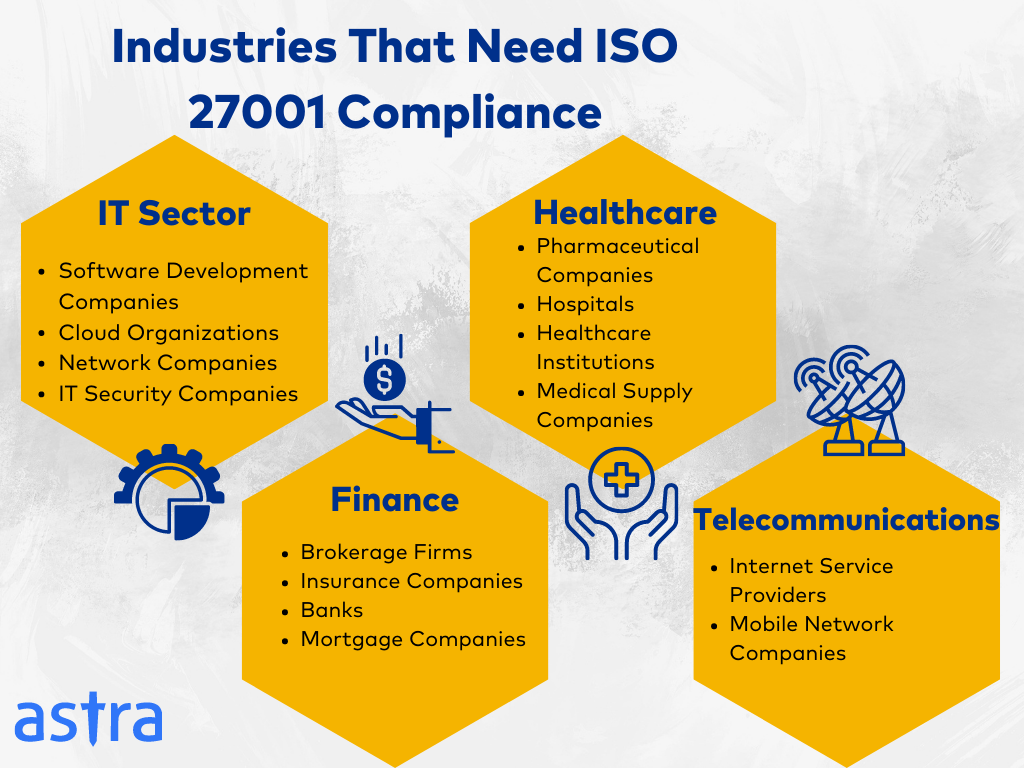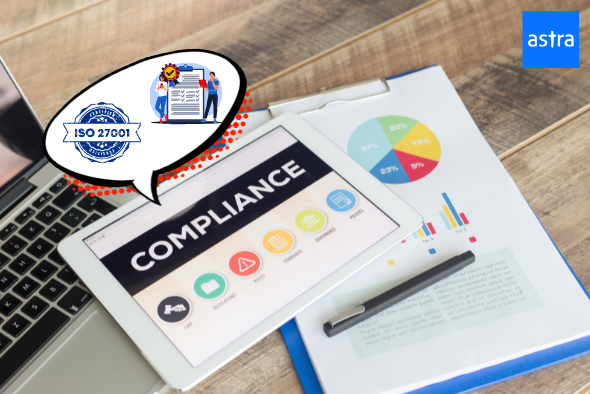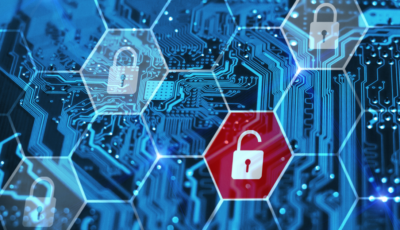Article Summary
This article provides a detailed view of what ISO 27001 compliance is and the industries that opt for this standard. The detailed steps and time duration taken to achieve ISO 27001 certification have also been elucidated. Finally, we have mentioned the 5 best ISO 27001 auditors and their features.
Cybersecurity is akin to driving a vehicle. They both have rules and regulations one needs to follow, and this is termed compliance. Being compliant while driving ensures personal safety and the safety of others out there. In the case of cybersecurity, the organization’s and its data’s safety.
Talk about taking a lesson from our surroundings right? You learn, attain, and maintain compliance so you can be the best and safest driver, or in our case, the best and safest compliant organization!
Industries rely heavily on the cyber world, and therefore certain standards and laws had to be kept in place to ensure the security of confidential information stored virtually. Here, compliance facilitates necessary protocols to ensure the safety of customers’ private details similar to how a driving license provides eligibility to an individual to drive.
Some of the common compliance laws and standards for various industries include SOC2, HIPAA, PCI-DSS, and lastly, ISO 27001. This article will focus on ISO 27001 compliance, its importance, and the industries it caters to specifically.
On a more important note, the article will also discuss what ISO 27001 audits are, the time taken to enforce the ISO 27001 compliance, different types of audits, and the steps for an ISO 27001 audit. We have also discussed in detail the five of the best ISO 27001 auditors for you to choose from, so read on!
| S. No. | Company | Features |
|---|---|---|
| 1. | Sprinto | 1. Zero-touch audits 2. Completion in weeks |
| 2. | Drata | 1. Constant Monitoring 2. Expert Staff Training |
| 3. | Secureframe | 1. Detailed Risk Reports 2. Real-time Alerts |
| 4. | Cyberops | 1. Strong Framework Management 2. Regular ISMS analysis |
| 5. | QMS International | 1. Provides Gap Analysis 2. Device Accessibility |
What is ISO 27001 Compliance?
A framework established for managing IT security, ISO 27001 (International Organization for Standardization)is followed by both government and private organizations to ensure the safety of consumer data.
The standard was first published in 2005 by IEC (International Electrotechnical Commission) and was updated in 2013. Another updated European version was released in 2017. The main purpose of this international standard is to set out specific standards for ISMS.
Information Security Management System (ISMS) was set as a holistic approach to maintaining the confidentiality, integrity, and availability of data stored by companies. It has a focus on employee behavior, processes followed, and management of data and technology.
ISO 27001 compliance help organizations to establish, implement, operate, monitor, review, maintain, and continually improve information security management systems. Let us check out the relevance of being compliant with ISO 27001 and also the significant industries that benefit immensely from being ISO 27001 compliant.
Importance Of ISO 27001 Compliance
The importance of ISO 27001 compliance lies in the goals it helps achieve which are detailed below-
- Data protection
The safety of customer data is assured when your organization is compliant with ISO 27001 requirements such as examining for vulnerabilities, assessment of processes, tools, and protocols placed for data safety regardless of what form the data is stored in, be it digital, on the cloud, or even as a hard copy.
2. Work-process Efficiency
An efficient workflow is brought about through ISO 27001 compliance by following the rules and regulations set in place. This results in employees being well aware of their responsibilities, and the chain of command to follow in case of any emergencies or security issues.
Also Read: Penetration Testing Compliance: An Easy to Follow Guide
3. Competitive Edge
With ISO 27001 compliance, your organization gets a competitive edge over other competitors by having ISO 27001 certification. This sets you apart from others in the industry in terms of efficiency, the standard of services, and customer satisfaction.
4. Compliance with Other Standards
Being ISO 27001 compliant also benefits your organization by helping achieve other compliance-related regulations and laws like EU GDPR and NIS Regulations (Network Information Systems).
5. Attractive Attribute
Having done an ISO 27001 compliance audit can also be an attractive factor for potential employees as it lends more authenticity and trustworthiness to your organization leading highly qualified individuals to be interested in working with your organization.
6. Trustworthiness
Being ISO 27001 compliant boosts your security system, along with which an added benefit is the increase in trust and reliability with your organization. This makes your services dependable for existing customers and increases your reputation.
7. Cost-Effectiveness
Achieving said compliance is the gateway to cost-effectiveness as the purpose of ISO 27001 compliance is to mitigate and reduce security risks and associated costs.
The above-mentioned benefits highlight the importance of ISO 27001 compliance and why all organizations must complete their ISO 27001 audit pronto! Fret not, this is something we will discuss and help you resolve further down below.
Also, read- ISO 27001 and Other Pentesting Compliances

Industries That Opt For ISO 27001 Audits
As mentioned at the beginning with most industries foraying into the cyber world, it is increasingly essential that they have an internationally standardized regulatory framework to follow to minimize the possibility of any data breaches.
In this scenario, the old adage that small companies do not need compliance is wrong since every customer is more aware and concerned about their data’s safety and every organization has the responsibility to ensure the same.
To put it simply, nowadays, not complying with international standards of security is akin to leaving the front door of your home open i.e. largely compromising the security of your organization.
That said, the industries that ensure ISO 27001 compliance are:-
- IT Sector- IT companies, software development, and cloud organizations opt for audits done by ISO 27001 auditors for compliance. This helps them to provide customers with products that are already compliant with regulatory laws like the EU’s GDPR, which is considered to be one of the toughest security laws in the world. This ensures the safety of their data and increases the reliability of the organization.
- Healthcare- Organizations within the healthcare industry including pharmaceutical companies, healthcare institutions, and hospitals always store many personal patient information including prescription details. It is vital for such organizations to ensure their customer data is secure and this is aided by being ISO 27001 compliant.
- Finance Industry- brokerage firms, insurance companies, banks, and other organizations within the financial sector need to be ISO 27001 compliant as a basic rule. This ensures the mitigation of any monetary risks and that their protocols and procedures enforce the laws and regulations within the industry.
- Telecommunication- internet service providers usually handle vast amounts of customer data thereby making it essential that they have top-notch security systems in place to avoid the risks of data breaches and leaks. This is where ISO 27001 compliance comes in handy.
Also Read: Cloud Security Audit: Everything You Need to Know
Areas Checked On During An ISO Audit
- Finance
During an audit, every part of your organization is analyzed very closely. This includes the financial aspect of your organization, from the way it handles client payments to the budget set for the year, and the savings accrued.
When audits are done expenses of the company are analyzed to see their relevance and smooth transaction, therefore it is important to have proper invoices and other documentation if any for this.
They also have to fit in with the budget set for the year and should not be a hasty, unplanned expenditure. This directly affects the saving your company has accrued at year-end.
- HR Compliance
Organizations are required by law to have a proper HR management system and to ensure that they follow the required laws and regulations.
This involves maintaining accurate employee records, documentation and file maintenance, and retention policies governing confidential data.
- Areas Of Improvement
Depending on the sector your company belongs to the procedures and processes followed will look different. However, there are SOPs for the same which must be followed and if deviated, there should be valid explanations with required documentation supporting it.
The processes followed by every organization can change with time and better practices may come along. Here an audit checks out these areas of improvement and sees if they are acceptable or need to be modified.
What Is The Timeline To Get ISO 27001 Compliant?
How long will this process takes, is a general question that is thought of by every company. The answer to this question depends on the size of your company and the resources that can be allocated to making this task a success.
For a small to medium-sized company, the entire process of becoming ISO 27001 compliant takes about 6 to 12 months in general. While for a larger company with a higher employee database (about 100+ employees), it could take around 1 to 1 ½ years to achieve ISO 27001 compliance. Certain ISO 27001 vendors can provide the ISO 27001 certification faster, but we’ll discuss that further down below.
Wondering why it takes so long? Well once we explain the steps in achieving compliance with the help of ISO 27001 providers, it will all make more sense. In the next section, we will explain in detail the steps taken by ISO 27001 providers to achieve compliance with an approximate time duration taken for the process.
Steps in Getting ISO 27001 Compliant
Let us check out the ten steps in getting ISO 27001 Compliant:
- Getting Ready
The initial step involves reading up and gaining a thorough insight into ISO 27001 compliance and the rules and regulations it covers. This is also the right time to choose a team and a plan for the implementation of your ISO 27001 compliance.
Choose someone within your organization or an expert ISO 27001 vendor to help you manage the task of achieving ISO 27001 certification. Ensure the ISO 27001 vendor you choose has relevant experience establishing ISMS and a thorough understanding of the requirements to implement within your organization.
- Establishing Scope And Objectives
During this step, your company needs to decide on the scope and the precise objectives of the information security management system. This should include an estimate for the manpower (hired ISO 27001 vendors and internal team members), project costs, and the timeframe required.
The scope of this project should also include the internal and external factors that influence the company’s IT security such as organizational structure, risk management criteria, and the working systems in place. Another major factor to be considered is the needs and requirements of the concerned stakeholders like clients, employees, and the government.
- Implementing A Management Plan
Once the scope and the objectives of the ISMS are planned successfully, the next requirement is to implement a plan to manage the journey to achieving your ISO 27001 compliance as smoothly and painlessly as possible.
This involves thoroughly managing your ISMS and ensuring its accountability, having a proper schedule of the activities that need to take place, and ensuring continuous auditing to ensure improvement in the strategies in place.
- ISO 27001 Compliant Risk Assessment
ISO 27001 compliance mandates continuous well-documented risk assessments to be done by ISO 27001 auditors. It doesn’t specify what type of risk assessment, but the best options are Vulnerability Assessments and Penetration Testing (VAPT).
The tests must be well planned, all assets should be encompassed within the testing scope, and the results should be detailed and recorded for the benefit of achieving ISO 27001 compliance.
- Implementing Mitigation Measures
Once the risks have been identified from the vulnerability assessments and penetration tests, the next step is to resolve them as soon as possible. The resolution of the risks identified can be based on the CVSS or severity score of the vulnerabilities found.
Based on these criteria you can decide which risks need to be terminated, resolved, or tolerated. At the end of implementing the mitigation measures, the company is expected to produce either a Risk Treatment Plan (RTP) or a Statement of Applicability as evidence of the testing done.
- Employee Training
Yet another crucial step in your quest to obtain an ISO 27001 certification, ISO 27001 compliance stipulated that employees must undergo awareness training to ensure their knowledge of information security remains current.
They’re also encouraged to follow policies that instill habits like locking their computers when they leave their workplaces and employing a clean desk policy where any documents, USBs, or other devices containing sensitive company information are put away securely before the end of the day.
- Documentation Audits
This is the step where all the documentation compiled until this point is carefully reviewed and audited to ensure that all the necessary documents for processes, assessments, policies, and procedures are readily available. The compilation may be a tedious task but the reward is sweet since achieving ISO 27001 is no slight feat.
The documentation should include the scope of ISMS, security objectives, detailed reports on risk assessments done, the risk treatment plan and statement of applicability reports based on the assessments, evidence of monitoring and reviewing as well as results of any corrective actions taken based on the monitoring.
- Monitor and Review
The ISO 27001 compliance states regular monitoring and reviewing of ISMS as a top priority. This is to ensure that the information security management system is constantly analyzed by ISO 27001 auditors to find areas of improvement and update them accordingly.
Such reviews and updates can increase the effectiveness of the ISMS, and increase the compliance standard of the company, resulting in optimization of the present working process. The records for the same should also be maintained well.
- Internal Audits
As a part of getting ISO 27001 certified it is essential to undergo regularly planned internal audits. Here all the information security management systems within your company are continuously audited.
Based on the audits, areas of improvement and non-conformities are identified to be fixed. It is not uncommon to find a few non-conformities during the initial audits but they should be fixed quickly to ensure a seamless journey to ISO 27001 compliance.
10. Certification Audits
During this stage of the audit, the auditor either virtually or physically will examine the on-site location, the company’s ISMS, and all the documentation gathered throughout the procedure.
Based on all the evidence the auditor will conduct a thorough assessment to decide whether your company complies with the ISO 27001 standard and if it is fit to be certified for the same.
Timeline Explained
The stages from getting ready to documentation audits take the most amount of time at 6-10 months. This is because each of the mentioned steps must be done comprehensively without missing a step or a document.
If any non-conformities or missing requirements are found then the steps may need to be repeated after the non-conformities are remedied taking an additional 4-5 months to get them all done. The audits as such take comparatively less time where only a few days to a maximum of 2 weeks are only taken to complete them.
The ISO 27001 certificate received upon successful compliance has a validity of 3 years. During this period internal audits are conducted regularly every six months and a review certification audit every year. After the three-year duration is up, the certification audits are conducted by the ISO 27001 providers again for re-certification.
Best ISO 27001 Auditors
Now that we have checked out the steps and the time duration required to achieve ISO 27001, it is time to help you out by providing a list of the 5 best ISO 27001 auditors that can make achieving ISO compliance easy peasy for you. We have also mentioned the features that make them some of the top ISO 27001 vendors for you to pick.
Sprinto
Sprinto’s smart combination of technology and automation brings a new speed to ISO 27001 security auditing where it’s done in mere weeks. Other features include-
- Automated evidence collection, comprehensive compliance checklist, and systems integration.
- Another feature of Sprinto is its zero-touch audits where Sprinto does all of the heavy work for your organization.
- Sprinto does not require customer data access but rather works by just monitoring the system’s configurations.
- They provide live sessions that help your organization to construct an implementation plan much faster.
Drata
A streamlined workflow is possible with Drata as you can personally oversee and manage every employee’s on and off-boarding with personnel tracking and access control. Other features are-
- They provide an automated regime to achieve ISO 27001 compliance.
- They also ensure round-the-clock compliance and security control monitoring.
- Provides dedicated support with expert staff members and security training for your organization’s staff.
- Drata’s pricing packages include startups, growth, and enterprise based on the size of the company and other influential factors.
Secureframe
With Secureframe, your company is assigned an account manager who ensures the build of an ISMS that is well suited to your company’s needs and work processes. Their offering includes-
- Monitoring over 150+ cloud services and scanning for major compliance frameworks like ISO 27001 and HIPAA.
- Provides detailed vendor risk reports and automated evidence collection ensures that your company stays compliant throughout.
- Real-time alerts for vulnerabilities found and also provide remediation steps to stay compliant.
- Detailed and hands-on guidance provided by expert ISO 27001 auditors to help with compliance that is unique to your organization’s needs.
Cyberops
They are a reputed and experienced firm of ISO 27001 auditors with understanding and experience on how to implement the best ISMS for one’s company. They provide-
- Strong framework management through accountability of ISMS schedules and routine audits to maintain improvement.
- Cyberops also conduct key awareness programs about information security for the members of the organization to help them understand and assimilate the ISMS structure better.
- Review and upgrade your documentation based on the ISO 27001 guidelines and template, thereby ensuring all your documents are ISO 27001 compliant.
- Conducts regular analysis and review of the information security management system in place to uphold compliance standards and efficiency.
QMS International
With this ISO 27001 provider, the process of certification takes as less as 45 days with their three major steps which include gap analysis, implementation of ISMS, and lastly certification after a thorough audit. Other factors include-
- QMS provides the organization with control of its ISO compliance through simple navigation and real-time reporting and accessibility through a computer or smartphone 24/7.
- Their prices vary depending on the organization’s size, and staffing.
Factors In Choosing The Right ISO 27001 Vendor
Let us now discuss some of the factors that you should consider when choosing the right ISO 27001 auditor to obtain your ISO 27001 compliance goals-
- Experience: The experience of the companies you’re considering as top contenders for furthering your ISO certification process should be excellent. A firm with a good client roster, years of experience, great testimonials, and reviews are important factors to consider.
- Reputation and Professionalism: You can also enquire first hand to the vendor’s clients regarding their services on your own to ensure that their reputation is favorable and that their professional.
- Language and Translation: If the ISO 27001 auditor you choose has an obvious language barrier this will affect the efficiency of your communication when trying to achieve ISO 27001 compliance. It is easier to make sure that the consultants hired have a good understanding of your company’s niche so they can translate the findings to your easy understanding.
- Not Documentation Driven: The ISO 27001 auditors chosen should not solely be driven by collecting and compiling the required documentation alone. They should equally be concerned with maintaining the standards of ISO 27001 compliance.
- Integration: The compliance vendors chosen should not only be well versed as an ISO 27001 provider but also should be able to integrate and implement other compliance standards like SOC2 or ISO 9001.
- Gap Analysis: Before making a decision, ask the ISO 27001 providers on your list whether they provide a gap analysis. This helps you take into account the current condition of your information security management system in place and the results can help you decide the further steps.
Conclusion
This article has detailed the importance and benefits of being ISO 27001 compliant and the detailed steps to achieve the same. With this, we have also mentioned the 6 best ISO 27001 auditors out there with their features for you to choose from.
Lastly, to ensure you make the right decision with regard to the ISO 27001 auditor you choose to meet your compliance certification requirements, we have added a list of features you should look for in the ideal ISO 27001 provider. Hope this detailed guide helped you out!
FAQs
1. Who performs ISO audits?
Unlike a certification review which is done by a third-party auditor or registrar, ISO audits are performed internally by ISO 27001 auditors based on the results of which your company’s ISMS is constantly improved.
2. Is internal audits mandatory for ISO 27001?
Internal audits are an essential part of ISO 27001 compliance. It allows the organization to continuously monitor and improve its information security management system based on the internal audit results.
3. What is an ISO 27001 checklist?
This is a checklist that helps the ISO 27001 vendors to gather all the required documentation about quality assurances, ISMS scopes and objectives, risk assessment, and subsequent risk treatment reports for a documentation audit.
















